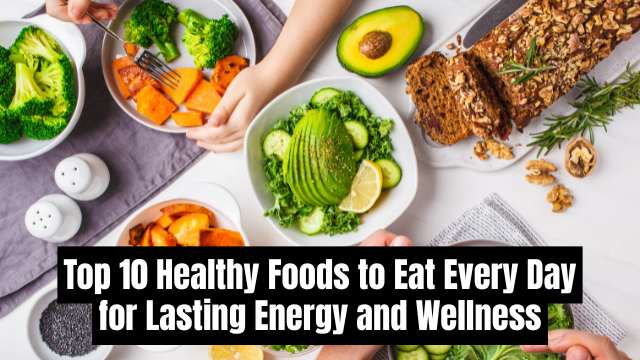Good health begins with good choices, and the foundation of a vibrant life often starts with what’s on your plate. In a world filled with fast food temptations and ultra-processed meals, getting back to basics is not only refreshing—it’s essential. Choosing the right foods can drastically improve your energy levels, enhance your immune system, and even sharpen your mental clarity.
While there are hundreds of nutritious options out there, some foods stand out for their daily health benefits. These are the foods that nourish your body from the inside out, offering an incredible array of nutrients, antioxidants, fiber, and essential fats. Here’s a deep dive into the top 10 healthy foods to eat every day that support vitality, weight management, and disease prevention without overcomplicating your diet.
Best 10 Healthy Foods to Eat Every Day for Lasting Energy and Wellness
1. Leafy Green Vegetables
From spinach to kale, leafy greens are nutrient-dense powerhouses that your body craves. Packed with vitamins A, C, K, and folate, they also deliver essential minerals like iron and calcium. Their high fiber content supports digestion while their antioxidants combat oxidative stress, lowering your risk of chronic disease. Consuming leafy greens daily can improve everything from heart health to bone density, making them a must-have on your plate.
Whether steamed, sautéed, added to a smoothie, or tossed in a salad, leafy greens bring versatility and value to every meal. In fact, diets rich in greens are consistently linked with reduced inflammation and better aging outcomes.
2. Berries
Blueberries, strawberries, raspberries, and blackberries are small but mighty when it comes to health benefits. Rich in vitamin C, fiber, and powerful antioxidants like anthocyanins, berries help fight inflammation and protect against heart disease and cognitive decline.
Eating berries every day supports skin health, boosts your immune system, and aids in weight management due to their natural sweetness and low-calorie profile. Their anti-aging properties and positive effects on blood sugar make them a go-to fruit for daily consumption.
3. Nuts and Seeds
Walnuts, almonds, chia seeds, and flaxseeds are more than just crunchy toppings. These plant-based sources of healthy fats, especially omega-3s, are known to support brain function and cardiovascular health. They are also loaded with fiber, protein, magnesium, and antioxidants, helping reduce inflammation and keeping you full longer.
Adding a handful of nuts or a sprinkle of seeds to your daily meals can regulate cholesterol levels, stabilize energy, and provide a satisfying, nutrient-rich crunch. Despite being calorie-dense, their satiating nature helps prevent overeating and promotes a balanced metabolism.
4. Whole Grains
Whole grains like oats, quinoa, brown rice, and millet provide slow-digesting complex carbohydrates that fuel your body steadily throughout the day. They are excellent sources of dietary fiber, B vitamins, and trace minerals like manganese and selenium.
Consuming whole grains daily supports digestion, balances blood sugar levels, and reduces the risk of type 2 diabetes and heart disease. Unlike refined grains, whole grains retain their germ and bran, which are key to their nutritional profile. Starting your day with a warm bowl of oatmeal or incorporating quinoa into your lunch can be a simple yet impactful dietary upgrade.
5. Greek Yogurt
Greek yogurt is a protein-rich, probiotic-packed food that contributes to gut health, muscle maintenance, and calcium intake. Its creamy texture and tangy flavor make it a popular choice for breakfast, snacks, or even savory dishes.
Daily intake of Greek yogurt helps improve digestion, boost immunity, and promote a healthy gut microbiome. The probiotics it contains can support mental health as well, linking gut health to mood and cognitive function. Opting for plain, unsweetened varieties ensures you get all the benefits without added sugars.
6. Avocados
Avocados are nature’s butter—smooth, satisfying, and incredibly nutrient-rich. They are loaded with heart-healthy monounsaturated fats, potassium, folate, and fiber. Eating avocados regularly can lower bad cholesterol, regulate blood pressure, and enhance nutrient absorption from other foods.
Their healthy fat content supports hormonal balance, skin elasticity, and brain function. Including half an avocado a day in your meals, whether on toast, in a salad, or as guacamole, is a delicious way to elevate your daily nutrition.
7. Legumes
Beans, lentils, and chickpeas are excellent plant-based protein sources packed with fiber, iron, and folate. They promote satiety, help regulate blood sugar, and contribute to a healthier heart.
Daily consumption of legumes has been linked to lower cholesterol, improved digestive health, and reduced risk of certain cancers. They’re incredibly versatile and can be used in soups, stews, salads, or as spreads like hummus. For vegetarians and meat-eaters alike, legumes are a nutritional powerhouse that can easily become a staple.
8. Cruciferous Vegetables
Broccoli, cauliflower, Brussels sprouts, and cabbage belong to the cruciferous family known for their cancer-fighting compounds like sulforaphane and indole-3-carbinol. These vegetables also provide high amounts of fiber, vitamins C and K, and several minerals.
Eating cruciferous vegetables daily supports detoxification, strengthens immune function, and may aid in hormone balance. They can be roasted, steamed, or eaten raw depending on your taste preference. Their pungent aroma may not be for everyone, but their health benefits are undeniable.
9. Garlic
Garlic is more than a flavor enhancer—it’s a medicinal marvel. Known for its antimicrobial, antiviral, and anti-inflammatory properties, garlic is a powerful immune booster. It contains compounds like allicin, which help lower blood pressure and cholesterol levels.
Including garlic in your everyday meals supports cardiovascular health and may help reduce the frequency of common colds. Crushed and allowed to sit before cooking, garlic becomes even more potent, enhancing both flavor and function in your cooking.
10. Green Tea
Though not a food in the traditional sense, green tea deserves a place on this list for its extensive health benefits. Rich in antioxidants like catechins, particularly epigallocatechin gallate (EGCG), green tea supports metabolism, brain function, and fat oxidation.
Drinking green tea daily can improve alertness, enhance fat burning, and offer protection against certain cancers and heart disease. It’s also beneficial for oral health and may lower the risk of neurodegenerative disorders. A warm cup in the morning or after meals can serve as a gentle, health-enhancing ritual.
Conclusion
Fueling your body with the right foods every day doesn’t have to be complicated or bland. The top 10 healthy foods to eat every day offer a perfect mix of taste, nutrition, and versatility. They empower you to live more energetically, think more clearly, and feel better overall. By making these superfoods a regular part of your meals, you’re taking an intentional step toward long-term health and well-being.
Instead of chasing trendy diets or fads, simply focus on adding these foods into your daily rotation. The benefits will speak for themselves—your body will thank you, your mind will feel sharper, and your overall wellness will thrive.
Frequently Asked Questions About Healthy Foods to Eat Every Day
Q1. Why is it important to eat these foods daily?
Answer: Incorporating these nutrient-dense foods into your daily routine helps provide essential vitamins, minerals, antioxidants, and fiber that support immune function, digestion, energy, and mental clarity.
Q2. Can these foods help with weight loss?
Answer: Yes, many of these foods promote satiety, balance blood sugar, and support metabolism, making them excellent choices for those seeking sustainable weight management.
Q3. Are these foods suitable for people with dietary restrictions?
Answer: Most of these options are plant-based and gluten-free, making them accessible for a wide range of dietary needs. However, individual allergies and intolerances should be considered.
Q4. How can I include these foods in my diet every day?
Answer: Small changes like adding greens to your smoothie, swapping refined grains for whole grains, or snacking on nuts can make a big difference without overhauling your entire diet.
Q5. Do these foods help with energy and focus?
Answer: Yes, foods rich in healthy fats, fiber, and antioxidants help stabilize blood sugar and improve brain function, leading to enhanced focus and steady energy throughout the day.


